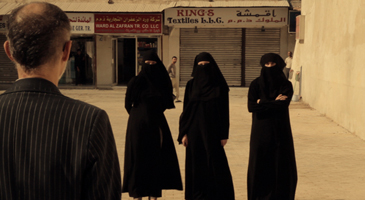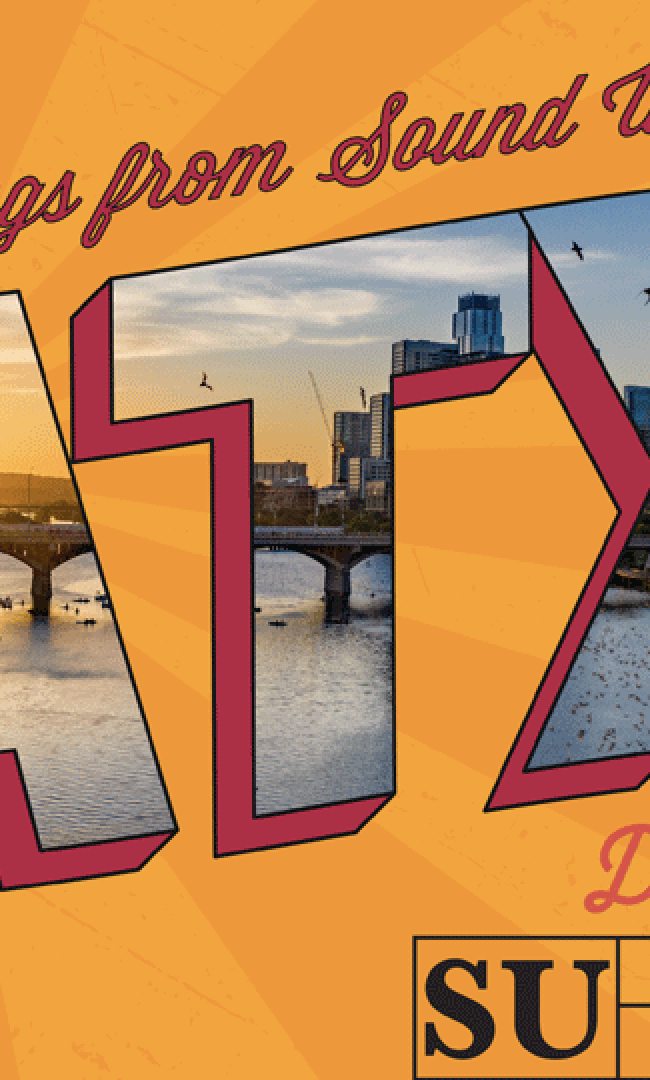A Conversation With Caveh Zahedi (THE SHEIK AND I)
(Thanks to Factory 25, The Sheik and I is now available and TV VOD via Verizon and InDemand, as well as through iTunes, Amazon, Vudu, and X-Box.)
Caveh Zahedi has always been a provocateur, and has never shied away from presenting himself in an unlikable manner in his films, resulting in often divisive reactions from his audience. His new film, The Sheik and I, may be his most provocative and divisive to date. Originally commissioned by the Sharjah Art Foundation (located in the United Arab Emirates) for their Biennial celebration, the current theme of which was “art as a subversive act.” Zahedi was given three constraints: no nudity, no making fun of the prophet Mohammed, and no making fun of the Sheik of Sharjah. Zahedi found the first two acceptable, but couldn’t get past the third: couldn’t he just make fun of the Sheik a little bit? The resulting film is a self-reflexive documentary about the making and unmaking of his Biennial project, as he pushes to see how far he can go in breaking the third rule. The film was subsequently banned by the Foundation, but Zahedi was able to acquire the rights to show it in the U.S., where it has now attracted controversy as well. (Zahedi’s short film on that subject, I Was Blacklisted by Thom Powers, can be seen on YouTube here. A comprehensive piece by Filmmaker Magazine editor Scott Macaulay is here.)
I talked to Caveh a couple nights before he posted his Thom Powers short, so our conversation focused mostly on the film itself.
H2N: So I remember this blog post you did, five or six years ago when I Am a Sex Addict came out, and you said something like postmodernism was dead or had run its course, but I notice you really like using the whole meta approach in your films, and I was wondering why you like using that so much.
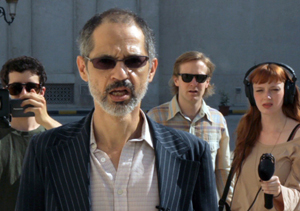 Caveh Zahedi: Hmm, I don’t know. Why does one like what one likes? I just know that there seems to me to be something impossible about straightforward speech in our culture. Like, it’s something so complicated in our culture, and everything seems to be so mediated that it’s hard not to speak in quotes and reference other things. It just seems like there’s a plethora of speech acts and propaganda and advertising. It really has to do with advertising, the way that so much speech has become in order to sell and persuade in a way that’s not direct. It just seems like honesty has become really tricky. So the “meta” thing kind of allows one to speak and at the same time be aware of the problems of speech. It just seems to be, I don’t know, essential to me. It feels like it’s the only way I can speak that feels satisfying, you know?
Caveh Zahedi: Hmm, I don’t know. Why does one like what one likes? I just know that there seems to me to be something impossible about straightforward speech in our culture. Like, it’s something so complicated in our culture, and everything seems to be so mediated that it’s hard not to speak in quotes and reference other things. It just seems like there’s a plethora of speech acts and propaganda and advertising. It really has to do with advertising, the way that so much speech has become in order to sell and persuade in a way that’s not direct. It just seems like honesty has become really tricky. So the “meta” thing kind of allows one to speak and at the same time be aware of the problems of speech. It just seems to be, I don’t know, essential to me. It feels like it’s the only way I can speak that feels satisfying, you know?
H2N: Yeah.
CZ: Wallace Stevens says that modern poetry is about the finding of a satisfaction, and I don’t know why, but I find self-reflexivity more satisfying, for some reason. I’m drawn to novelty and, to me, it feels like meta-fiction hasn’t been fully explored in the way that straight ahead narrative has been, or straight ahead documentary has been. And also I think process is really important. You know, most people tend to hide the process that goes into works of art, and it seems like that’s part of the problem in our culture, not part of the solution.
H2N: I think you might have answered this one in the film [The Sheik and I], but did you ever intend to finish the actual film within the film?
CZ: Well, it was a work in progress, and I didn’t really know what we were going to do, but the basic idea was to come up with scenes from a film, fragments from a film, rather than a coherent film. And I think we had discussions during the shooting that maybe we should try and make a coherent film. But that was never my goal. My goal was to shoot various disparate scenes from a sort of Hollywoodish film about the Sheik.
H2N: How have the audience reactions to the new film been?
CZ: Very polarized. There are a lot of people who are angered by it, and there are people who really seem to appreciate it. It’s been more polarizing than I expected.
H2N: What is the main thing they’re offended by? Is it your total lack of reverence?
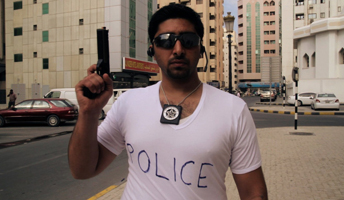 CZ: That’s part of it. But I think the main thing is that they’re worried about the people in the film, and they feel that ethically it’s problematic for someone to make a film where they could possibly get in trouble. That’s the main one. And then there’s the whole fatwa thing, and then just the general rudeness. I think it’s a very P.C. thing about Arab culture, you know, we’ve been at war, we owe them a big apology, we shouldn’t be there. We don’t know anything about them.
CZ: That’s part of it. But I think the main thing is that they’re worried about the people in the film, and they feel that ethically it’s problematic for someone to make a film where they could possibly get in trouble. That’s the main one. And then there’s the whole fatwa thing, and then just the general rudeness. I think it’s a very P.C. thing about Arab culture, you know, we’ve been at war, we owe them a big apology, we shouldn’t be there. We don’t know anything about them.
H2N: Yeah, I was cringing near the end. I was pretty much worried for everyone involved. Has anyone in fact gotten in trouble?
CZ: I don’t think so. I mean, the film hasn’t come out yet, so the verdict’s still out. But I don’t think anyone is going to get in trouble. We negotiated a settlement with the government and went through a lot of trouble to get the wording a certain way. I guess the thing to worry about is the irrational element of angry Muslims. There’s a film programmer in the States, Thom Powers, who has been trying to suppress the film, trying to get festivals not to show it and press not to write about it. I just made a short film about that, actually.
H2N: So is the threat of a fatwa a real possibility?
CZ: Well it’s really hard to know, these things are all hypothetical. I mean, I know a Muslim filmmaker who has worked in the region and he has told me that people will definitely try to kill me because of this movie. iIt’s hard to imagine that he’s right, but people are definitely scared about that possibility. Some journalists have told me that they’re afraid of writing about the movie. So you know, the climate of fear is effective.
H2N: Should I be afraid?
CZ: [CZ Laughs] I don’t know! I don’t think so. You can be if you want! It’s optional. If you think about it, it’s absurd. And yet, it’s worrisome. I mean, why would writing about it get you in trouble? It’s crazy. But the intimidation campaigns are so effective that people do worry about it.
H2N: So what would you say the overriding theme of your work is?
H2N: Acceptance? So people’s acceptance of you?
CZ: Uh, no. [CZ Laughs] That’s part of it, but I think the struggle to accept reality. I think that’s what we’re all here to do, and I think the films are all about that on some level.
H2N: How do you think the new one fits in with your previous work?
CZ: Gee, I don’t know. It seems to me it’s more of the same. What do you think?
H2N: I mean, it is, but it’s also…I mean the fact that you’re really offending people [CZ Laughs], and that you’re going to another country and offending people over there makes it feel different to me.
CZ: Yeah, people have told me it seems different to them, but it doesn’t seem that different to me. Someone said my other films seem more vulnerable than this one, like I seem more on the defensive, or more in opposition to others. But I don’t know. I’m probably in opposition to others in all the films, really. You know, it’s more overtly political, I guess.
H2N: So, this may have been covered in the film to a certain extent, but I still can’t get over how the Biennial commissioned artists to create works with “art as a subversive act” as the theme. I mean, it just seems obvious that an artist is going to make something that is subversive, and that did what your film did.
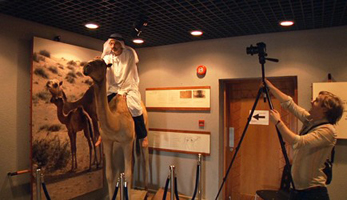 CZ: Well, that’s the central irony of the film of course, and all I can say is: I think because they’re from the Middle East [CZ Laughs], you know, I think they hired me because they thought of me as an Iranian filmmaker. And I think any Iranian filmmaker would have known not to do that. They would have known how to be subversive within the strictures of society without getting in trouble. And they did commission other filmmakers, and no other filmmaker got banned, so whatever people did was not subversive enough to get them in trouble or get them disinvited. So I just think they figured, you know, “subversive” in quotes, something that seemed subversivish, but not really. You know, it’s just part of the whole advertocracy, you know, trying to be cool. “Wouldn’t it be cool to have this theme?” But they didn’t think anyone would really take it literally.
CZ: Well, that’s the central irony of the film of course, and all I can say is: I think because they’re from the Middle East [CZ Laughs], you know, I think they hired me because they thought of me as an Iranian filmmaker. And I think any Iranian filmmaker would have known not to do that. They would have known how to be subversive within the strictures of society without getting in trouble. And they did commission other filmmakers, and no other filmmaker got banned, so whatever people did was not subversive enough to get them in trouble or get them disinvited. So I just think they figured, you know, “subversive” in quotes, something that seemed subversivish, but not really. You know, it’s just part of the whole advertocracy, you know, trying to be cool. “Wouldn’t it be cool to have this theme?” But they didn’t think anyone would really take it literally.
H2N: But there wasn’t only you, there was that other artist too, right?
CZ: Oh right, yeah, he got banned too. There were two people that got banned. But there were a hundred other artists, and nine other filmmakers, and nobody else got banned.
H2N: Is there anything in particular you wanted to say about the whole thing?
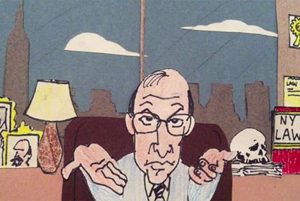 CZ: It’s been a very educational experience for me, because, you know I didn’t really go in there expecting any of this or trying to make this happen. I just found myself coming up against these contradictions, you know, where they ask for one thing but don’t really mean it. Basically, it comes down to money, where people can sort of buy themselves into legitimacy, or buy themselves into the art world, and the art world is run on money, you know. And there’s a contradiction between art and oppression, or art and censorship, or art and blasphemy laws, you know, those are not compatible propositions. And so there’s just this contradiction within the culture where they’re trying to be Westernized, but they don’t have Western ideals or values. I think that I just kind of got caught in the middle of this change, there’s this change happening. They’re sort of reaching for something, but aren’t willing to go all the way with it yet. And so they ask for subversion, and I give it to them, and then they’re like, “No, no, no, no, that’s not what we meant” and the whole thing got shut down. That wasn’t really just me, that was just like a consequence of the contradictions inherent in the social context that I just was a symptom of.
CZ: It’s been a very educational experience for me, because, you know I didn’t really go in there expecting any of this or trying to make this happen. I just found myself coming up against these contradictions, you know, where they ask for one thing but don’t really mean it. Basically, it comes down to money, where people can sort of buy themselves into legitimacy, or buy themselves into the art world, and the art world is run on money, you know. And there’s a contradiction between art and oppression, or art and censorship, or art and blasphemy laws, you know, those are not compatible propositions. And so there’s just this contradiction within the culture where they’re trying to be Westernized, but they don’t have Western ideals or values. I think that I just kind of got caught in the middle of this change, there’s this change happening. They’re sort of reaching for something, but aren’t willing to go all the way with it yet. And so they ask for subversion, and I give it to them, and then they’re like, “No, no, no, no, that’s not what we meant” and the whole thing got shut down. That wasn’t really just me, that was just like a consequence of the contradictions inherent in the social context that I just was a symptom of.
And then as far as trying to get the film out into the world, there was also the whole blacklisting of the film in the United States, which was really surprising to me. The thing I really realized was that if people are afraid to say something about Islam because they could get killed for doing that, and if journalists are afraid to write about my film or Islam or whatever, the fact that we have freedom of speech and freedom of the press in this country means nothing. I mean, we don’t have freedom of the press and freedom of speech anymore if people are successfully intimidated by the threat of being killed. It doesn’t matter what our laws say, people aren’t acting freely if they think that they can die for it. So in a way, they’ve succeeded. I mean, we want them to adopt freedom of speech, and they want us to adopt blasphemy laws, they want us to adopt their system of values, and we want them to adopt ours. And they’ve actually succeeded in us adopting theirs, you know, de facto, not openly. And that is a new thing, that people are afraid for their lives to say certain things that should be said, that are true. And artists are supposed to speak the truth, and that’s what art is supposed to be. So artists are kind of in this odd position, where if you speak the truth about that you could die. And that’s what all the Middle Eastern artists already know, so I guess they figured commissioning work from Middle Eastern artists was safe. You know, they don’t want to get killed, and they know better than to say something that could get them killed.
So that’s been a real eye opener. And about how I’ve always taken the principle of free speech for granted. You know, “Of course you can say whatever you want.” But it really was a rare and special thing and it no longer really exists.
— Michael McWay







